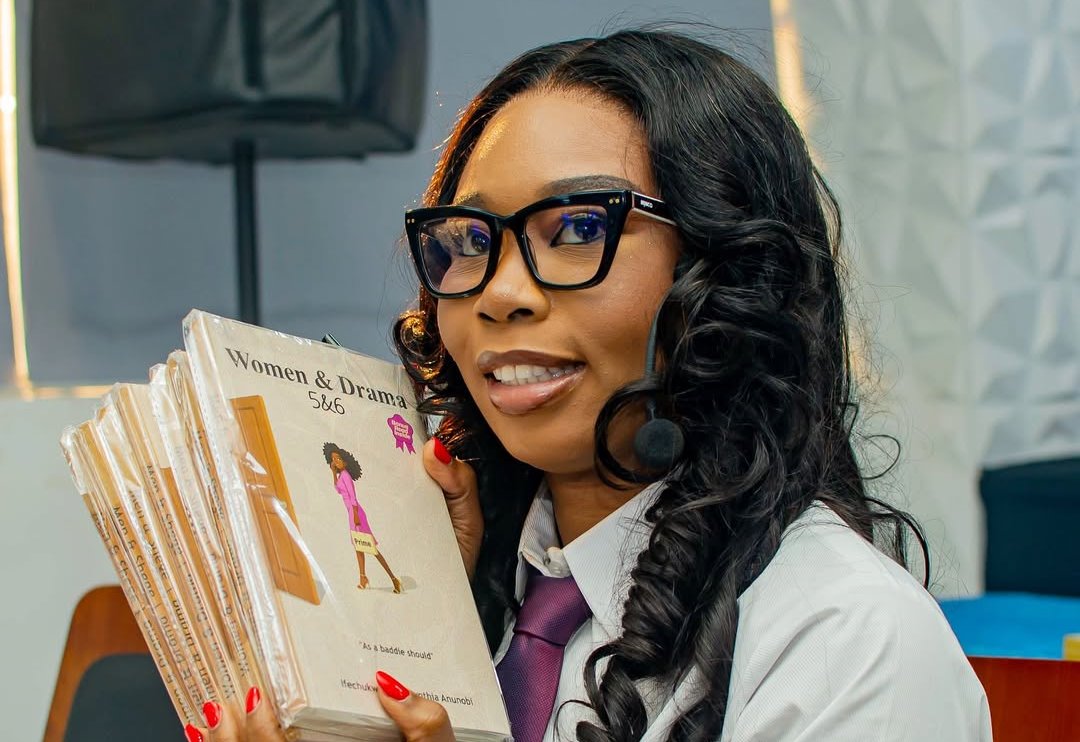There are books that entertain, some that enlighten, and then there are those that quietly dismantle you–story by story, sigh by sigh–because they speak too closely to realities you know, have seen, or fear. Men & Shege 5&6, Women & Drama 5&6, a dual-sided tête-bêche by Ifechukwu Mary-Cynthia Anunobi, is one such collection. It is not merely because it tells unfamiliar tales, but because it holds up a mirror so uncomfortably honest that even laughter feels like a form of protest.
Told through a chorus of women’s voices, the book captures the jagged terrain of love, longing, deception, resilience, and emotional survival in modern Nigerian relationships. Each story is saturated in lived experience –whether it’s the quiet humiliation of a woman forced to shrink in a man’s house she helped furnish, or the loud absurdity of a “just-vibe” boyfriend quoting scripture mid-gaslight. These are prose and meditation in its unfiltered rawness.
Anunobi eschews formal structure. Most stories feel like journal entries you weren’t supposed to read but somehow did–intimate, breathless, and often unresolved. Her characters rarely have names. Some don’t even have punctuation. But this fragmentation is deliberate. It mirrors the emotional chaos her characters navigate–being the other woman without knowing, being the one who stayed too long, the one who gave too much, or the one who walked away just before being broken.
There is no neat moral arc in these stories, instead, there are moments…short, sharp recognitions of self: “I am not mad, I am in love,” one narrator admits, before acknowledging she is indeed mad. Another woman, weary from chasing closure, deletes the number mid-conversation. No revenge. Just release. Many of the narrators suffer in silence, until silence becomes a wound too loud to ignore.
This collection reminds me of the subtilties between the female and the male mind as explored in Allan and Barbara Pease’s Why Men Don’t Listen and Women Can’t Read Maps. Exploring the biological, psychological and evolutionary differences between men and women especially in the context of intimacy, affection, relationships, and communication.

What distinguishes Anunobi’s style is not grand language but radical honesty. Her diction is local, her rhythm oral, and her wit, blistering. This is storytelling unburdened by the need to impress. Words like “shege,” “God abeg,” and “na so e dey start” recur with ritualistic power. There’s a casual poetry in her turns of phrase, and as such, pain becomes satire; satire becomes balm.
She doesn’t write from above or with pity. She writes from presence. She doesn’t “give voice” to women, she is the voice, amplifying the collective disillusionment, quiet rage, and occasional joy of women raised in cultures that romanticise suffering and reward silence.
Themes: What the Stories Really Say
Looking at the themes across the stories, Anunobi interrogates power through emotional, sexual, spiritual nuances. Men in these tales don’t wield power because they are evil; they wield it because patriarchy permits, rewards, and disguises it. A man gives a woman everything from visa to dollars to attention–until he doesn’t. Another breaks up with a woman not with words, but by ‘ghosting’ her at the embassy. One woman fasts for 21 days hoping God will return a lover. God doesn’t, but her own clarity does.
In these pieces, women mostly chose sanity over romance, and some others walked into fire despite the evident red flags. But even when they break, they do so with grace. One woman, after surviving a traumatic marriage, simply says, “I am now a BSc holder in housewife.” That single line carries the weight of years of gaslighting, broken dreams, and survival.
Beyond recounting tales about men or relationships, this collection is a cultural critique that mirrors the society. It is a subtle cultural critique–of churches that romanticise endurance, of families that silence daughters “for peace,” of a society where a woman’s worth is tied to how much she can endure. It is also an archive of modern womanhood in Nigeria: where therapy is rare, community is digital, and laughter is a coping mechanism.
The tête-bêche format itself is symbolic. You flip the book, just as many of the women must flip their hairs of expectations, their loyalties, their hopes –often midway through the story. The duality of Men & Shege and Women & Drama is not about gender war; it’s about gendered experiences. The “shege” men bring isn’t just romantic, it’s structural, cultural, sometimes spiritual. And the “drama” women face isn’t just emotional but some inherited generational, and internalised mechanism.
Ifechukwu Mary-Cynthia Anunobi has not written a conventional book. She has compiled emotional testimonies, political insights, cautionary tales, and therapeutic monologues into a slim volume that punches above its weight. Her stories do not ask for pity. They demand reflection. They urge action. They whisper warnings and shout affirmations.
In a society in which women are called upon and over again to shrink, to adapt, to wait, to pray, to bear, and “to understand,” Men & Shege 5&6, Women & Drama 5&6 offers permission to feel, to leave, to laugh, and to live again.
This book will not heal your relationship problems, but it will name them. And at times, that is where healing starts.
Anunobi has a Psychology, International Law, Masters in Business Administration degree, no wonder her stories carry a dash of such broad gamut of scholarship.


 Trending
Trending 